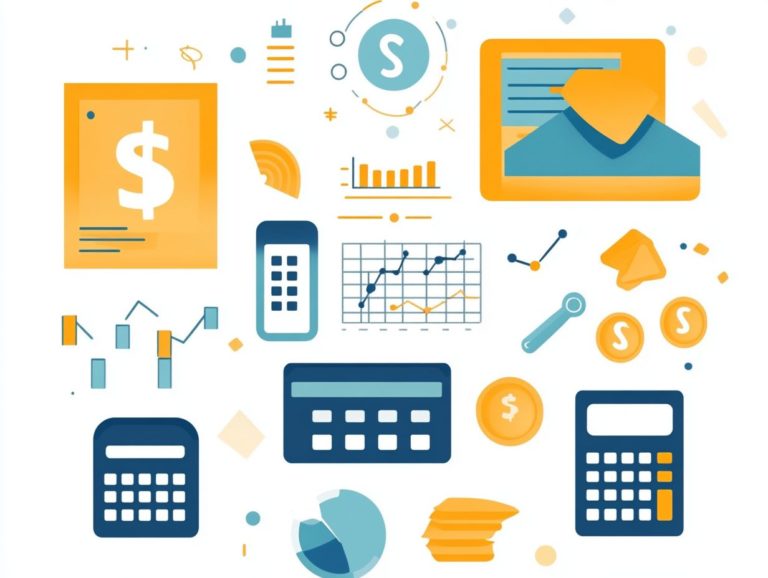What is Financial Literacy?
Ready to boost your financial skills? Let’s dive in!
Understanding financial literacy is essential in today’s complex financial world, where your ability to make informed financial decisions can profoundly influence your personal finance.
This article delves into the significance of financial literacy, emphasizing the advantages of being financially savvy while breaking down key concepts such as budgeting techniques, saving strategies, and investment products.
You’ll find valuable financial literacy resources and strategies to enhance your financial knowledge, tailored to various life stages from young adults embarking on their financial journey to those thoughtfully planning for retirement savings.
Empower your financial future and seize control of your financial well-being by improving your financial habits!
Contents
- Key Takeaways:
- Why Financial Literacy is Important
- Basic Concepts of Financial Literacy
- Improving Financial Literacy
- Financial Literacy for Different Life Stages
- Tips for Young Adults
- Considerations for Families
- Planning for Retirement
- Frequently Asked Questions
- What is Financial Literacy?
- Why is financial literacy important?
- How can I improve my financial literacy?
- What are the consequences of being financially illiterate?
- Is financial literacy only important for adults?
- Are there any resources available for improving financial literacy?
Key Takeaways:

- Financial literacy is the knowledge and ability to understand and manage personal finances effectively.
- Being financially literate leads to better financial decision-making, increased financial stability, and improved quality of life.
- Important concepts of financial literacy include budgeting, saving, investing, retirement planning, and debt management, which can be learned and improved through various financial literacy programs and activities.
Defining Financial Literacy
Financial literacy is your gateway to understanding and effectively managing your personal finances, including credit scores numbers that reflect your creditworthiness and financial products. It encompasses a variety of essential skills, including budgeting, saving, investing, and deciphering financial products. It’s important to master these skills in today’s complex economy.
You must navigate the financial world confidently, make informed decisions, and cultivate healthy money skills to reach your financial aspirations.
By enhancing your financial awareness, you arm yourself with the knowledge necessary to avoid financial scams and pitfalls, ultimately paving the way to greater financial well-being and financial independence.
This foundational understanding equips you with the tools to budget effectively while encouraging a proactive approach to managing credit card debt, student loan debt, and investments. Financial literacy gives you the power to evaluate various investment products, enabling you to make choices that resonate with your risk tolerance and long-term objectives.
Improved financial literacy benefits you and your community. Knowledgeable consumers like yourself are more likely to engage meaningfully in the economy, driving growth and stability for everyone involved.
Why Financial Literacy is Important
Grasping the significance of financial literacy is vital, both for you and society at large, as it directly shapes your financial decisions, financial management, and the overall economic landscape.
By establishing a robust foundation in financial education, you become adept at managing your money, steering clear of debt traps situations that make it hard to escape debt and devising long-term financial strategies, such as retirement savings and investment accounts.
This knowledge doesn’t just empower you; it also enhances the economic well-being of your community by promoting responsible spending and fostering a heightened sense of financial self-awareness through financial literacy activities.
Benefits of Being Financially Literate
Being financially literate brings a wealth of benefits that can elevate your quality of life and sharpen your financial management skills. Improved budgeting abilities, better debt management, and the ability to set and reach realistic financial goals come naturally through financial literacy resources.
Grasping financial concepts not only boosts your awareness but gives you the power to make informed decisions about saving strategies, investments, and retirement planning.
With financial literacy, you ll develop the confidence to make savvy investment choices, potentially leading to higher returns over time, especially by understanding compound interest (the interest on a loan or deposit calculated based on both the initial principal and the accumulated interest from previous periods). By mastering ways to budget and leveraging money tools, you can allocate your resources wisely, ensuring your essential needs are met while still setting aside funds for your financial goals and future aspirations.
This knowledge equips you with powerful tools to tackle any financial challenge. It helps you navigate unexpected expenses and emergencies, ultimately reducing financial stress, preventing financial pitfalls, and promoting a healthier lifestyle.
In essence, cultivating a strong understanding of financial principles paves the way for long-term stability and effective financial planning, preparing you for a secure financial future.
Basic Concepts of Financial Literacy
A solid grasp of fundamental concepts in financial literacy is essential for anyone looking to enhance their personal finance knowledge and develop their budgeting skills. Important concepts include budgeting, saving, understanding financial products, and managing credit card debt.
- Ways to budget
- The significance of saving
- An array of investment products
- Effective debt management strategies
By understanding these core principles, you can cultivate robust budgeting skills, enhance your financial planning, and pave the way for lasting financial independence in the future.
Budgeting and Saving

Budgeting and saving are pivotal aspects of financial literacy that empower you to manage your finances with finesse and reach your financial goals, including establishing an emergency fund. By honing your budgeting skills, you can track your income and expenditures, craft personal budgets, and implement saving strategies that enhance your preparedness for emergencies.
Building strong financial habits early helps you manage money better and accumulate wealth over time.
Mastering the art of budgeting not only illuminates your spending patterns but also gives you the power to allocate funds toward essential needs while reserving money for well-deserved discretionary expenses through efficient budgeting techniques. Techniques like the 50/30/20 rule can streamline your budgeting process. This rule suggests allocating 50% of your income to necessities, 30% to wants, and 20% toward savings, debt repayment, and building emergency funds.
Automating your saving transfers can help you build an emergency fund, allowing you to save consistently without the mental gymnastics, while enhancing your overall financial preparedness. Ultimately, embracing these strategies cultivates a robust sense of control over your financial decisions, enabling you to plan effectively for both short-term needs and long-term aspirations through informed financial decision-making.
Are you ready to take charge of your financial future? Take the first step toward financial freedom today!
Investing and Retirement Planning
Investing and retirement planning are crucial for securing your financial future. They help you understand investment products and build wealth over time.
Diversifying your portfolio think real estate, ETFs (Exchange-Traded Funds), and index funds can reduce risks and create growth opportunities. Knowing the tax benefits of these investments can also make a big difference.
Understanding 401(k) and IRA (Individual Retirement Account) tax advantages boosts your returns. These smart choices help you manage your financial landscape confidently.
Improving Financial Literacy
Improving your financial literacy is an ongoing journey. Numerous resources and educational tools are available today.
Engage with financial literacy programs, attend workshops, or explore online resources to enhance your financial understanding.
Resources and Strategies
Using various resources is essential for improving financial literacy. Tools like money management apps and debt counseling can elevate your skills.
If you want to learn more, check out free online courses from Coursera or Khan Academy. Budgeting apps like Mint can help you track expenses effectively.
Reading books by financial experts or following trusted finance blogs can introduce you to key concepts. By combining these resources, you can create a strong learning path that builds your confidence.
Financial Literacy for Different Life Stages
Financial literacy is important at every life stage. It shapes how you manage money and make informed decisions.
Tailoring financial literacy programs for groups like young adults or retirees enhances understanding and well-being.
Recognizing the unique challenges at each stage helps you develop effective money management habits.
Tips for Young Adults

For young adults, mastering financial literacy is essential for building a strong base for future financial success. Make it a priority to understand your credit score; it can open doors for you!
You should also focus on managing student loan debt and honing effective budgeting skills that promote responsible spending. This knowledge enables you to secure favorable loan terms and enhances your chances of landing better rental agreements and job opportunities, as many employers review credit histories.
Prioritizing debt management is vital. Consider strategies like the snowball method or debt consolidation to tackle high-interest loans efficiently, while also being aware of interest rates.
Embracing budgeting tools, whether through apps or traditional methods, gives you the power to track your spending and prioritize savings. By making informed financial decisions from the beginning, you can cultivate a sense of financial responsibility and pave the way toward long-term stability.
Understanding budgeting techniques is essential to achieving your financial goals. Start taking control of your finances today!
Considerations for Families
For families, effective financial literacy means embracing collaborative financial planning and budgeting practices that align with your shared goals. Thoughtful family budgeting, paired with strategic saving techniques, gives you the power to manage expenses more efficiently.
This preparation helps you prepare for emergencies and invest in your children’s futures. By cultivating a culture of financial awareness at home, you create a supportive environment that helps everyone navigate financial complexities.
This approach involves not just tracking income and expenditures but also engaging in open conversations about financial priorities and values. Setting collective goals whether it’s saving for a family vacation or funding a child’s education is essential for building a united financial front.
Regularly reviewing budgets as a family allows you to adjust them according to changing circumstances, like new job opportunities or unexpected expenses. These practices not only hone your financial management skills but also strengthen family bonds.
Fostering teamwork and accountability in your journey toward financial success and improved financial well-being is crucial. Are you ready to take charge of your family’s financial future?
Planning for Retirement
Planning for retirement is a crucial component of financial literacy, ensuring you can sustain your standard of living in those later years. It’s vital for you to grasp the various retirement planning options available, such as 401(k) accounts and IRAs, which are retirement savings plans that offer tax benefits.
By embarking on your retirement planning early, you can fully leverage the power of compound interest and other financial tools, setting a secure foundation for your financial future and optimizing your retirement savings.
Consider diversifying your investment portfolio with a strategic mix of stocks, bonds, and mutual funds to maximize your growth potential. Health savings accounts (HSAs) are valuable assets, providing tax benefits that help cover medical expenses in retirement.
It s important for you to assess your risk tolerance and periodically revisit your retirement goals as your life circumstances change. Partnering with financial advisors can offer you tailored strategies that align with your personal objectives.
This highlights the significance of ongoing education and adaptability in your retirement planning journey, along with the importance of financial literacy resources. Start taking charge of your retirement planning today!
Frequently Asked Questions
What is Financial Literacy?
Financial literacy refers to the knowledge and skills necessary to understand and manage personal finances. It includes understanding financial concepts such as budgeting, saving strategies, investing, and managing debt, making it an essential component of personal finance.
Why is financial literacy important?

Financial literacy is key. It empowers people to make informed choices about their money.
This knowledge leads to financial stability and security. It helps avoid debt and plan for a bright future.
How can I improve my financial literacy?
Improving financial literacy is easy. You can take classes, read articles, and seek advice from experts.
Practicing good financial habits also helps. Use resources like books and websites to boost your learning.
What are the consequences of being financially illiterate?
Being financially illiterate can lead to serious problems. It often results in overspending and accumulating debt.
This can cause financial stress and lower your quality of life. That’s why understanding money matters is crucial.
Is financial literacy only important for adults?
No way! Financial literacy is important for everyone, regardless of age. It’s never too early to learn about money.
Kids should be taught about money management from a young age. Developing good habits early sets them up for success.
Are there any resources available for improving financial literacy?
Absolutely! Many resources are available, including online courses and budgeting tools. Check out financial education programs at banks and institutions.
These workshops can greatly enhance your financial knowledge. Take advantage of them to become financially savvy!






